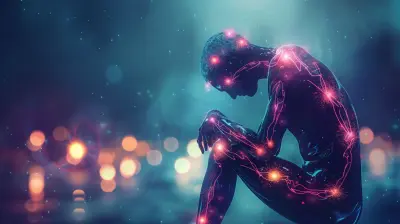13 April 2025
Let’s talk about something that often gets overlooked but is absolutely essential to your well-being—magnesium. Yep, that humble little mineral everyone learned about in high school biology but forgot almost instantly. But here’s the juicy part: magnesium plays a wild number of roles in your body, and one of its MVP titles? Helping keep your hormones in check.
If you've been feeling off lately—like your moods are swinging like a pendulum, your sleep is trash, PMS is raging, energy is flatlined, or anxiety is hanging around like an unwanted guest—your magnesium levels might be waving a white flag. So, grab your favorite drink, get cozy, and let’s get into why magnesium might just be the unsung hero your hormones need.
What Exactly Is Magnesium (And Why Should You Care)?
Magnesium is a mineral, and not just any mineral—it's involved in over 300 enzyme reactions in your body. That means it’s basically the behind-the-scenes manager keeping everything running smoothly, from muscle function and nerve signaling to blood sugar regulation and, yep, hormonal balance.Think of it like oil in a car engine. You don’t always see it, but without it? Everything grinds to a halt—or worse, blows up. That's kind of what’s happening inside your body when you’re running low on magnesium.
How Magnesium Impacts Hormonal Stability
Okay, so how does magnesium actually help with hormones? Let’s break it down.1. Regulates Cortisol (The Stress Hormone)
Cortisol is your body’s built-in alarm system. It’s helpful in small doses—like when you're running late or dodging a rogue shopping cart in a parking lot. But chronic stress means cortisol is constantly being pumped out, and that can wreak havoc.Enter magnesium. It helps calm your nervous system by literally lowering the release of cortisol. When your body has enough magnesium, it’s better equipped to handle stress gracefully instead of flipping out.
_Think of magnesium as the chill friend who gently takes the wine glass from your hand and tells you to breathe._
2. Supports Insulin Sensitivity
Insulin is another key hormone—it's in charge of helping blood sugar get into your cells so you can use it for energy. When insulin isn’t working properly (insulin resistance), you may gain weight, feel tired all the time, and even mess with estrogen and testosterone levels.Magnesium improves insulin sensitivity, helping to keep your blood sugar stable. Steady blood sugar equals fewer mood swings and cravings. Who doesn’t want that?
3. Helps Balance Estrogen and Progesterone
If you menstruate, you’ve probably had a love-hate relationship with these two hormones. Estrogen and progesterone play a huge role in mood, fertility, energy levels, and even how well you sleep.Magnesium helps metabolize estrogen in the liver and supports progesterone production. So if your PMS symptoms are next-level or your periods are all over the place, magnesium could be the missing puzzle piece.
4. Boosts Thyroid Function
Your thyroid is the tiny butterfly-shaped gland sitting in your neck that rules your metabolism. Thyroid hormones regulate how fast or slow things go in your body—everything from heart rate to how easily you gain or lose weight.Magnesium is essential for converting the inactive form of thyroid hormone (T4) into its active form (T3). No magnesium? That conversion doesn’t happen as smoothly, and your thyroid ends up slacking on the job.
Symptoms of Magnesium Deficiency
Here’s where it gets real: most people aren’t getting enough magnesium. Even if you eat a pretty healthy diet, modern farming has stripped a lot of magnesium out of the soil. Translation? Less of it ends up in your food.So how do you know if you're running low?
- Fatigue or low energy
- Brain fog
- Muscle cramps or twitches
- Anxiety or irritability
- Trouble sleeping
- Hormonal imbalances (irregular cycles, PMS, mood swings)
- Sugar cravings
- Headaches or migraines
Sound familiar? You're not alone.
Hormones That Benefit From Magnesium (A Deeper Dive)
Let’s zoom in on some specific hormones and see how magnesium gives them a helping hand.🔸 Estrogen
Estrogen isn't just about periods. It boosts mood, supports bone health, and keeps your skin plump. But too much of it—or poor metabolism of it—can lead to symptoms like bloating, breast tenderness, heavy periods, and even increased risk of certain cancers.Magnesium helps the liver break down excess estrogen so your body can eliminate it efficiently. It’s like taking out the trash—you don’t want it piling up. Especially not this kind.
🔸 Progesterone
This is the calming, soothing hormone that balances estrogen. Low progesterone = anxiety, insomnia, and irregular periods.Magnesium nurtures the part of your brain (the hypothalamus-pituitary-adrenal axis) that tells your body to produce more progesterone. Think of it like a coach giving pep talks to your hormonal system.
🔸 Melatonin
Magnesium helps activate melatonin, your sleep hormone. Poor sleep is a major culprit for hormonal imbalance. Ever notice how everything just feels worse when you're exhausted? Yep, magnesium can help fix that.🔸 Testosterone
Ladies need testosterone too! It plays a role in libido, muscle strength, and energy. Magnesium can increase free testosterone levels by binding to proteins that would otherwise “lock it up.”How To Increase Your Magnesium Intake (Without Going Crazy)
So, how can you actually get more magnesium without breaking the bank or popping pills all day?🥦 Eat Magnesium-Rich Foods
Here's your shopping list:- Leafy greens (spinach, Swiss chard)
- Nuts and seeds (especially pumpkin seeds and almonds)
- Whole grains (quinoa, brown rice)
- Dark chocolate (yes, really!)
- Avocados
- Bananas
- Beans and legumes
Just be sure to go organic when you can—conventional produce can be low in magnesium due to depleted soil.
💊 Consider a Supplement
Sometimes food just isn't enough. If you’re dealing with serious symptoms, a supplement could help—especially during PMS or high-stress times.Look for forms like:
- Magnesium glycinate (great for anxiety and sleep)
- Magnesium citrate (helps with digestion and constipation)
- Magnesium threonate (brain booster)
Always start slow and consult with a healthcare provider. Some forms (like oxide) aren’t absorbed as well and can lead to, ahem, bathroom emergencies.
🛁 Try Epsom Salt Baths
Epsom salts are basically magnesium sulfate. Soaking in a warm bath lets your body absorb magnesium through your skin—awesome for muscle cramps, stress relief, and sleep.Light some candles, throw on a playlist, and give yourself spa vibes at home.
When Should You Focus More on Magnesium?
Honestly? Pretty much all the time. But especially if:- You’re under constant stress
- You deal with PMS or PMDD
- You’re pregnant or postpartum
- You’re approaching menopause
- You have blood sugar issues or insulin resistance
- You’re on hormonal birth control
Birth control pills, by the way, deplete magnesium, which only adds to the hormonal chaos. Ain’t that a kicker?
Busting the Myths About Magnesium
“You can get enough just from food.”
In theory, yes. In reality? Not so much. Unless you’re crushing kale like a bunny and living on an organic farm, you're probably not hitting your needs every day.“Only women need to worry about magnesium and hormones.”
Nope. Men need balanced hormones too. Low magnesium can contribute to low testosterone and high stress hormones—even in dudes.“I take a multivitamin—it’s got magnesium.”
Check the label. Most multis have a tiny amount, and it's usually the poorly absorbed kind. You'd need way more to actually see the benefits we're talking about.Final Thoughts: Magnesium Is Your Hormones’ Best Friend
If your hormones are throwing tantrums, magnesium might be the jack-of-all-trades they’ve been missing. It plays so many backstage roles keeping things balanced that once you start getting enough of it, you're likely to notice better moods, smoother cycles, deeper sleep, and more energy. It’s like flipping the “everything’s okay now” switch in your body.So next time you’re wondering why you feel off—even though you’re “doing all the right things”—check in with your magnesium. That tiny mineral might be the biggest game-changer for your hormonal stability.





Ryan Ramos
Magnesium often remains the unsung hero in our quest for hormonal balance. Its role in neurotransmitter regulation and stress response highlights the intricate dance between our body’s chemistry and overall well-being. Embrace magnesium for a harmonious life.
April 16, 2025 at 4:51 AM